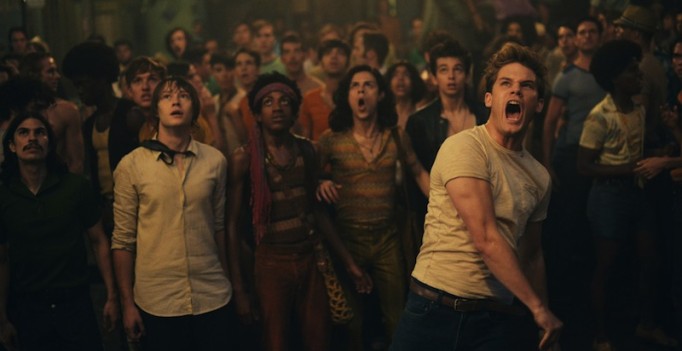Stonewall quickly came and went. It was played at TIFF last year, and screened in the U.S. markets for a short time. Critically and popularly reviled, Roland Emmerich’s pet project is completely different from his usual disaster films like Independence Day and The Day After Tomorrow. Indeed, Stonewall is a heavily whitewashed take on the famous New York riots that played an integral part in formalizing the LGBTQ equality movement.
Gay teenager Danny (Jeremy Irvine) flees his small Indiana town to seek refuge on New York’s Christopher Street. There, he meets a band of queer derelicts (led by Ray, played by Jonny Beauchamp). As a result, Danny becomes enmeshed in diametrically opposing sides of queer culture (the assimilatory ideology favoured by the more bourgeoisie queer, and the more transgressive, confrontational proletariat).
Emmerich demonstrates limited understanding of queer politics. Despite being openly gay himself, Emmerich’s naiveté frequently gets in his own way. As a result, Stonewall frequently plays with problematic representations. A key player in the protest, Marsha P. Johnson (a prominent drag queen) is reduced to a bit comedic part. Instead, Danny, a white male protagonist, is not only situated in the centre of events, but as the principle instigator of them.
Aside from its elision of key people involved in the protests and its clear marginalization of visible minorities, Stonewall frequently falls apart due to a poorly written screenplay and Emmerich’s lack of control over content and form. Moments such as when Danny screams “Gay Power!” before lobbing a brick at the Stonewall is more campy than dramatic.
However, Stonewall occasionally veers away from the neoliberalized priorities of the LGBTQ equality movement – namely same-sex marriage. Instead, Emmerich is more concerned with LGBTQ homelessness, an issue often ignored in other similarly whitewashed queer media (Modern Family comes to mind).
Stonewall is a complete mess. Mired in its deliberate and unintentional misunderstandings of queer politics, it works best as a campy example of a film that’s “so bad, it’s good”.
**********
Do You Tweet? Follow These Tweeple:
Mark Barber: @WorstCinephile




Be the first to comment